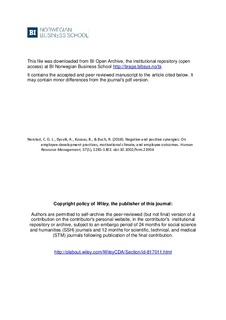| dc.contributor.author | Nerstad, Christina G. L. | |
| dc.contributor.author | Dysvik, Anders | |
| dc.contributor.author | Kuvaas, Bård | |
| dc.contributor.author | Buch, Robert | |
| dc.date.accessioned | 2019-01-28T11:29:11Z | |
| dc.date.available | 2019-01-28T11:29:11Z | |
| dc.date.created | 2017-12-15T11:45:53Z | |
| dc.date.issued | 2018 | |
| dc.identifier.citation | Human Resource Management. 2018, 57 (5), 1285-1302. | nb_NO |
| dc.identifier.issn | 0090-4848 | |
| dc.identifier.uri | http://hdl.handle.net/11250/2582601 | |
| dc.description.abstract | While previous studies have increased our knowledge of how employees’ perceptions of devel-opment practices influence employee outcomes, the role of potential contingencies in this rela-tionship remains relatively unexplored. In the present study, we set out to contribute to thisresearch by exploring whether congruence or lack of congruence between perceived employeedevelopment practices and the perceived motivational climate at work influence employee per-formance and turnover intention. A field study among 169 employees from a Norwegian finan-cial organization revealed that lack of congruence may be detrimental in terms of workperformance and turnover intention. Implications for practice and future research arediscussed. | nb_NO |
| dc.language.iso | eng | nb_NO |
| dc.publisher | Wiley | nb_NO |
| dc.subject | Process theory | nb_NO |
| dc.subject | Motivational climate | nb_NO |
| dc.title | Negative and Positive Synergies: On Employee Development Practices, Motivational Climate, and Employee Outcomes | nb_NO |
| dc.type | Journal article | nb_NO |
| dc.type | Peer reviewed | nb_NO |
| dc.description.version | acceptedVersion | nb_NO |
| dc.source.pagenumber | 1285-1302 | nb_NO |
| dc.source.volume | 57 | nb_NO |
| dc.source.journal | Human Resource Management | nb_NO |
| dc.source.issue | 5 | nb_NO |
| dc.identifier.doi | 10.1002/hrm.21904 | |
| dc.identifier.cristin | 1527949 | |
| cristin.unitcode | 158,4,0,0 | |
| cristin.unitname | Institutt for ledelse og organisasjon | |
| cristin.ispublished | true | |
| cristin.fulltext | original | |
| cristin.fulltext | postprint | |
| cristin.qualitycode | 2 | |
